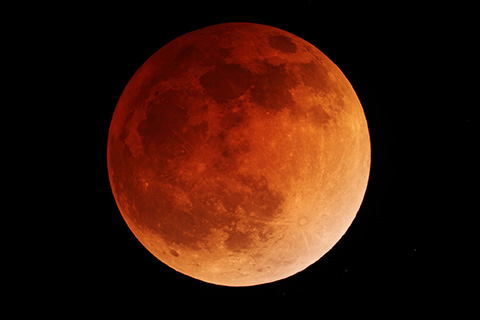 January 11, 2019
January 11, 2019
On Sunday night January 20 the moon passes through the earth's shadow to create what is known as a Total Lunar Eclipse. Weather permitting, the Delta College Planetarium in Bay City will hold a free viewing session from its rooftop observation deck starting at 10:30pm local time. Clear or cloudy, the planetarium will provide a free live program in its Dome360 Theatre beginning at 10pm which will include a live video cast of the event from other locations around the U.S.
A lunar eclipse happens when the sun, earth and moon are in perfect alignment and the orbital movement of the moon carries it through the earth’s shadow over the course of a few hours. Anyone on the night side of the earth facing the Full Moon during that time can witness the event. While lunar eclipses can happen up to twice a year, this will be the last total lunar eclipse visible from Michigan until May 16, 2022.
Visitors are encouraged to dress warmly for viewing. Telescopes and binoculars will be set up for the public to view through with the guidance of planetarium staff and members of the Sunset Astronomical Society.
The moon will begin passing into the earth’s shadow at 10:34pm, at which time the curved shadow of the earth will slowly advance across the face of the moon. The lunar surface will be completely immersed in the shadow of totality between 11:41pm to 12:43am, giving it a distinctive reddish color. The red and orange hues come from the bending of light through the earth’s atmosphere and sometimes promote the term Blood Moon. From 12:43 to 1:51am the moon will gradually reappear as it gradually moves out of the earth’s shadow.
“Much has been made of the extra labels attached to this lunar eclipse,” says Mike Murray, Astronomer and Manager of the Planetarium. “Some of the terms have been around for centuries, like the January Wolf Moon. This is most commonly credited to the Native Americans who noticed the wolves howling more often in January because of their breeding season,” Murray says.
Other more modern and sensationalized terms include the Supermoon, when the Full Moon is near its closest approach to earth in its elliptical orbit, causing it to appear slightly larger in the sky.
“And then there’s the Blood Moon,” Murray adds, which is inspired by the reddish hue the moon takes on during totality. “This label didn’t become all the rage until 2013 when a book was written about a series of lunar eclipses called a Tetrad.”
For more information about the event, visit www.delta.edu/planet. News media interested in covering the event should contact Mike Murray, Astronomer and Planetarium Manager at 989-667-2270 or mikemurray@delta.edu. The Delta College Planetarium and Learning Center is located at 100 Center Avenue in downtown Bay City.